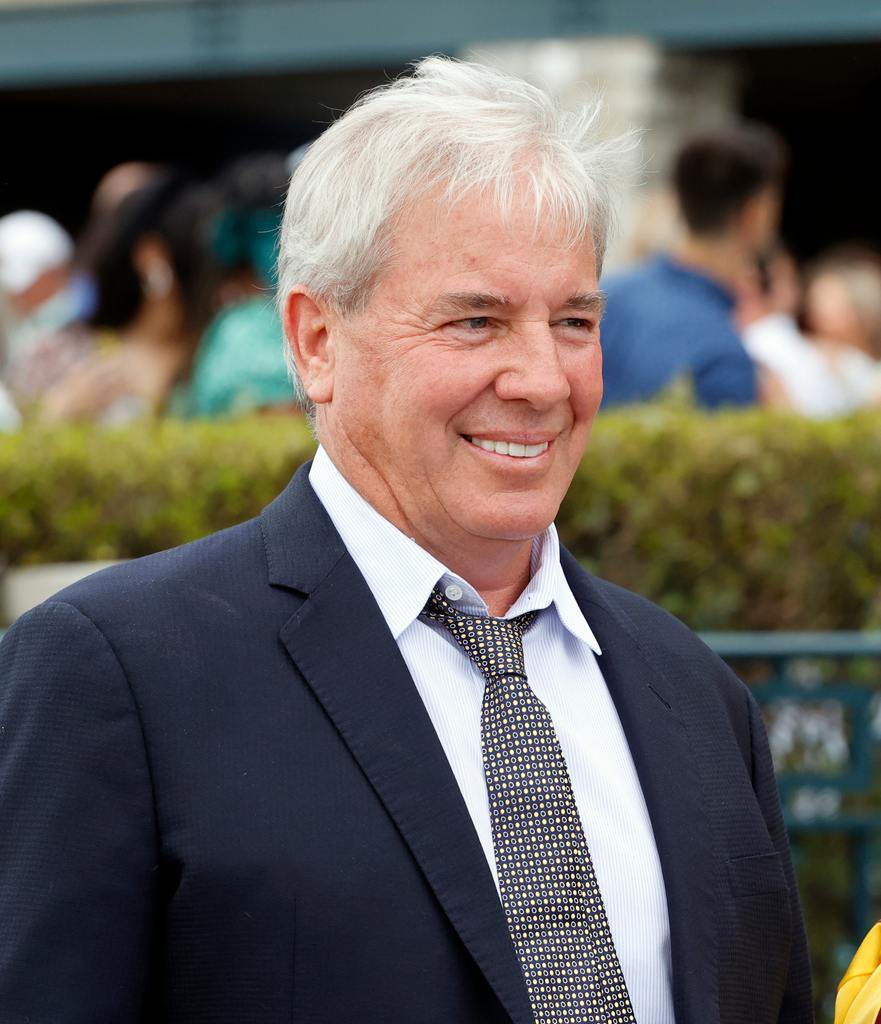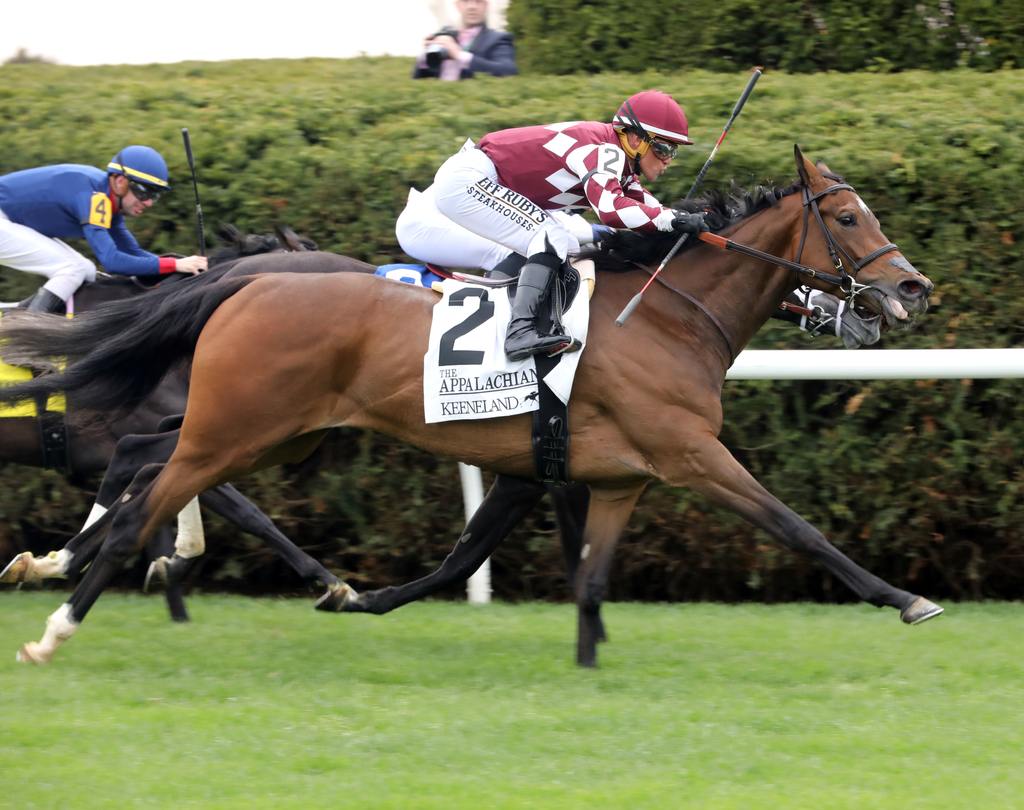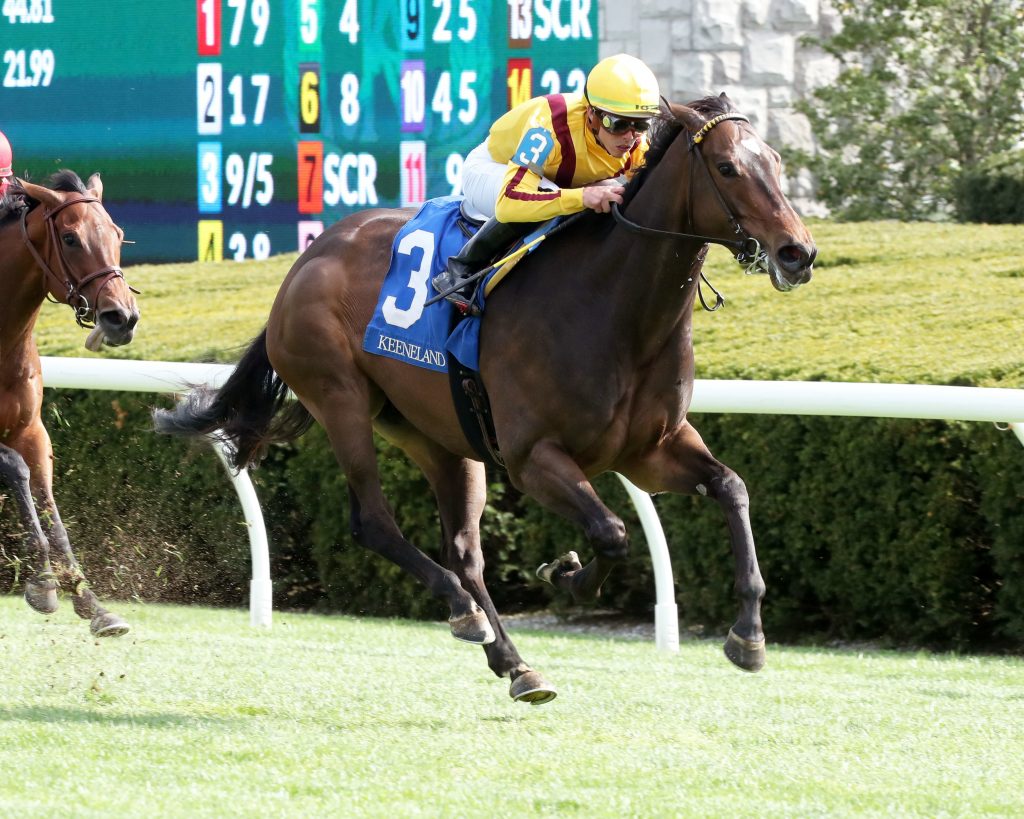
Love Reigns won the 2023 FanDuel Limestone for trainer Wesley Ward at the 2023 Keeneland Spring Meet. (Keeneland/Coady Photography)
‘Hey, I’m having a conversation with the Queen of England’
Gulfstream to Host Pair of Automatic Royal Ascot Qualifiers on Turf May 13
Motion: “When you know how difficult it is, you appreciate it even more.”
Story By Phil Janack
HALLANDALE BEACH, Fla. – Nearly a decade and a half has gone by since his first horses arrived at Royal Ascot to compete on the famed English racecourse founded by Queen Anne in 1711, but trainer Wesley Ward’s memory of the maiden voyage is crystal clear.
At the time, American-based Thoroughbred trainers rarely, if ever, made the trip overseas to take on Europe’s best horses. And they never won.
“When we got there everybody went, ‘Hey! All right! Good luck!’” Ward recalled with a laugh, “and as I turned my back and walked away, they were like, ‘What is this boy doing?’”
His gamble was rewarded when 2-year-old colt Strike the Tiger captured the 2009 Windsor Castle Stakes to make Ward, then 41, the first American trainer to win a race at Royal Ascot. The next day Jealous Again, a 2-year-old filly he also owned in partnership, won the Queen Mary (G2).
“The racing gods came together,” Ward said, “and we’ve been able to get the Americans over there at least knowing they have a chance now.”
This weekend, for the first time ever, horses will have the opportunity to earn an automatic berth plus a $25,000 equine travel stipend to England for one of the six 2-year-old races Royal Ascot when Gulfstream Park hosts the $100,000 Royal Palm Juvenile and $100,000 Royal Palm Juvenile Fillies, both scheduled for five furlongs on the turf May 13.
This year’s Royal Ascot meet runs June 20-24. Overall, Ward owns 12 wins at Royal Ascot, eight of them with 2-year-olds, and he not only points for the races each year but his success has encouraged other American-based horsemen to make the pilgrimage, as well.
“A lot of it is thanks to Wesley,” Hall of Fame trainer Mark Casse said. “We’ve gotten a lot more press, so you have more owners seeing and wanting to try it.”
Casse is the only other American trainer to win a race at Royal Ascot thanks to two-time champion mare Tepin, who in 2016 beat males in the meet’s signature opener, the Queen Anne (G1), considered Europe’s most prestigious one-mile race.
“I have to be honest with you, when we took Tepin over there I didn’t realize what a big deal it is. My wife calls it the Kentucky Derby on steroids,” Casse said. “It was a just amazing. As a trainer, it was one of the highlights of my career. To meet the Queen was so special. It’s the experience of a lifetime, it truly is, and hopefully someday I’ll be able to do it again.”
Graham Motion, a Maryland-based native of England that won the 2011 Kentucky Derby (G1) and 2013 Dubai World Cup (G1) with Animal Kingdom, is also quick to credit Ward with being a catalyst for other American trainers.
Motion has never won at Royal Ascot but finished second in the Coronation Cup (G1) with Sharing in 2020 and Spendarella in 2022. He brought Miss Temple City over three times and saw her run fourth in the 2015 Coronation Cup and 2016 Duke of Cambridge (G2) and 13th in the 2017 Queen Anne.

“I think if Wesley hadn’t been the pioneer of showing that it could be done, we probably wouldn’t be jumping on the bandwagon. It always seemed, to me, certainly pretty daunting to go over there,” Motion said. “And I still think it is unless you do the right races, because you can definitely get in trouble if you take them out of their own game.
“For me personally, having grown up in England, I really want to go and win one of those,” he added. “But it is a huge undertaking and credit to Wesley, he found his niche and he’s done remarkably well at it. I also think when Mark Casse went over with his filly, I don’t think she probably got enough credit. When you know how difficult it is, you appreciate it even more.”
Ward won the Eclipse Award as champion apprentice jockey of 1984, but weight issues forced his retirement in 1989. The Selah, Wash. native went to work as an assistant to his father, trainer Dennis Ward, before going out on his own in 1991.
By the time of his Royal Ascot debut, Ward had won nearly 800 races including 13 graded-stakes and had forged a reputation for early developing 2-year-olds that continues today.
“I was just looking at races. I kind of got going as a trainer by getting going early with my 2-year-olds and winning some early 2-year-old races when some of the better 2-year-olds didn’t come out until mid-summer. When I started in California, in March and April they’d have quarter-mile races at Santa Anita for big purses. It was tough to kind of break in at that time in southern California. You had Charlie Whittingham and all these great trainers. You had D. Wayne Lukas when he was at the height of his career. You can just go on and on and on. Then you go down to the claiming races and you had Mike Mitchell and all these big claiming trainers. For a young guy trying to break in, it was almost impossible.
“So, I got to looking and found a little niche where they had 2-year-old races. I thought if I bought some inexpensive but physical, fast-looking 2-year-olds, they’d be able to start early and I’d be ready to go, and it worked out,” he added. “Each and every year when they started racing, I’d have my 2-year-olds ready to go and when all the better 2-year-olds came out at Del Mar, I had already won my races and the big purses and I was able to either sell them or run them in the claiming $50,000 or whatever, and people would claim them off me. So, I was able to kind of profit and get clients.”
Ward eventually got married and relocated with his young family to the East coast, setting up shop in South Florida over the winter and setting the stage to ultimately move his primary base to Kentucky.
“I was able to utilize the good weather in the wintertime and have [the 2-year-olds] ready. When we started going up to Kentucky, I thought they’d win, and then we looked for a secondary spot and I thought, ‘Why not Ascot?’ They have this big, huge meeting there and maybe they’re a little bit the same way. The 2-year-old races are in June and maybe some of their trainers aren’t getting going with their better stuff until the summer, so I figured I’d take a chance with some of my precocious 2-year-olds that had already won.
“Every horse that I’ve been successful with, from my very first winner, has come back to be a really good horse. It’s not like you can have a horse break his maiden and go over there and be successful. I’ve tried that many, many times and the horses that are successful end up coming back here and are graded-stakes horses eventually,” Ward said. “They end up to be true quality. Not one horse that I won with was like, ‘Well, I got lucky.’ They all came back, and they were serious horses.”
Among Ward’s other Royal Ascot winners are Undrafted, the first American horse to win a Group 1 at the meet in the 2015 Diamond Jubilee; Lady Aurelia, the first American horse to win twice at Royal Ascot in the 2016 Queen Mary and 2017 King’s Stand; and Campanelle, who matched Lady Aurelia’s feat in the 2020 Queen Mary and 2021 Commonwealth Cup, the latter via disqualification.
“I guess I kind got lucky in hindsight, because the first year I went over I had some real quality 2-year-olds, for my standards anyway. They were good and we caught weather – because that’s the big factor over there, the weather – that was like a heat wave. It was like 80 degrees, so the ground was just really, really fast,” he said. “My horses had already won wire-to-wire and so when I got them in the races, they just kind of broke and were in front and they had such a big advantage. They just couldn’t catch me. Looking back now, everything kind of came together. If it was rainy and soggy like it can be there at Ascot where you get deluge rain, I’d probably have run last in every race and never went back again.”
Another benefit of Royal Ascot was having the privilege of meeting the late Queen Elizabeth II, an avid horse racing fan and owner who died in September 2022 at the age of 96.
“Having grown up in England, for me I never imagined I’d meet the Queen,” Motion said. “I sat with her in the Royal box the year we took Miss Temple City the first time, which was something I’ll never forget. It was quite special.”
Ward found the Queen warm, inviting and inquisitive.
“A few years into it she requested my presence a few times, and I met her and my kids met her. When No Nay Never won, she invited me to sit with her for 30 minutes and watch a race. That was just unbelievable,” Ward said. “I had a great talk with her, and she did most of the talking, actually. She had such a keen interest in racing. She was asking me all these different questions of what I do and how I prepare and how I tell the jockeys to ride the races. She just kept firing questions at me and about 15 to 20 minutes into the conversation you sit back and realize, ‘Hey, I’m having a conversation with the Queen of England, just me and her.’ It was wild.”





